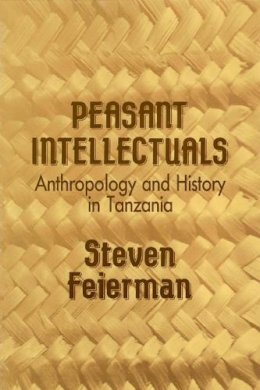
Stock image for illustration purposes only - book cover, edition or condition may vary.
Peasant Intellectuals: Anthropology and History in Tanzania
Steven M. Feierman
€ 33.89
FREE Delivery in Ireland
Description for Peasant Intellectuals: Anthropology and History in Tanzania
Paperback. Based on ethnographic research conducted from 1966, this book includes interviews with people from all levels of Tanzanian society. The author provides a history of the struggles to define the basic issues of public political discourse in the Shambaa-speaking region. Num Pages: 320 pages, 10 maps. BIC Classification: 1HFGT; 3JH; 3JJ; JFCX; JHM. Category: (UP) Postgraduate, Research & Scholarly; (UU) Undergraduate. Dimension: 234 x 156 x 23. Weight in Grams: 562.
Scholars who study peasant society now realize that peasants are not passive, but quite capable of acting in their own interests. Debate has continued, though, on whether coherent political ideas emerge within peasant society, or whether peasants act in a world where political issues are defined by elites. Based on ethnographic research begun in 1966 that includes interviews with hundreds of people from all levels of Tanzanian society, ""Peasant Intellectuals"" aims to alter the perspective from which anthropologists, historians, and political scientists study both cultural systems and rural politics. Steven Feierman gives us the history of the struggles to define the most basic issues of public political discourse in the Shambaa-speaking region of Tanzania. Over the past 150 years ruling chiefs, on the one hand, and dissenting peasants on the other have debated what it is that enables some regimes to bring life rather than death, prosperity rather than hunger, justice rather than inequity. Feierman focuses on the role of peasant intellectuals - men and women who earn their livelihood by farming and who, at crucial historical moments, have organized political movements of the greatest long-term significance. In Shambaii, peasant intellectuals have raised the issue of democracy, the role of chiefs, the meaning of slavery and freedom , and the nature of gender relations, and played a critical role in nationalist campaigns. Feierman also shows that peasant society contains a rich body of alternative sources of political language from which future debates will be shaped.
Product Details
Format
Paperback
Publication date
1990
Publisher
University of Wisconsin Press
Condition
New
Number of Pages
320
Place of Publication
Wisconsin, United States
ISBN
9780299125240
SKU
V9780299125240
Shipping Time
Usually ships in 7 to 11 working days
Ref
99-1
Reviews for Peasant Intellectuals: Anthropology and History in Tanzania
